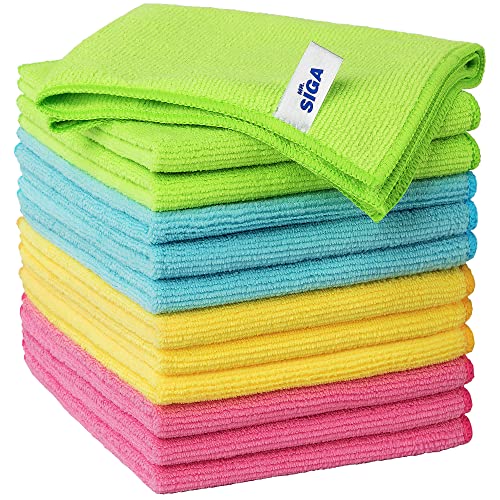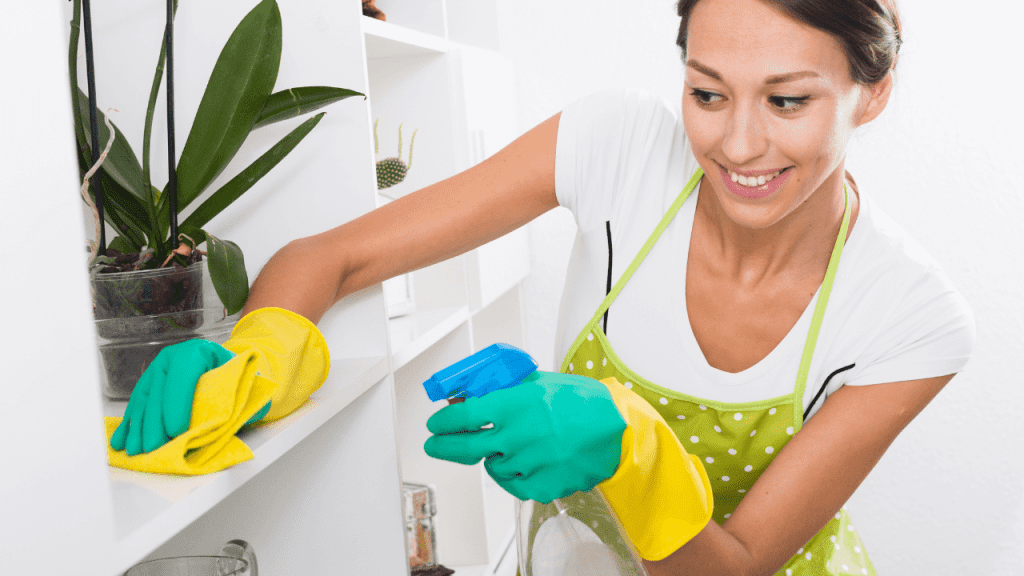They say that the kitchen is the heart of the home. It is where we prepare our meals, spend quality time with our family and friends, and create new memories. However, amidst all the bustle and activity that happens in the kitchen, it is easy for it to become a breeding ground for bacteria and germs. This is why maintaining the cleanliness and hygiene of your kitchen is of utmost importance. In this article, we will explore the reasons why cleaning the kitchen is necessary and the best practices to maintain a clean and healthy kitchen.
Must-Have Cleaning Essentials For Every Home (Recommended):

- Consistently delivers the same smell, color, and results - every time. For superior and safer cleaning performance, in and around your home.

- Great household product for anything that needs a bright new look! Use it as a cleansing booster with your laundry or dish detergent, as a pH buffer in swimming pools, or for cleaning kitchen surfaces.
What is the importance of keeping your kitchen clean?
Preventing foodborne illness
One of the primary reasons to keep your kitchen clean is to prevent the risk of foodborne illness. Bacteria, viruses, and parasites thrive in unhygienic areas and can easily contaminate food and ingredients. This can lead to severe health problems such as diarrhea, vomiting, and even hospitalization. By regularly cleaning and sanitizing your kitchen, you can reduce the risk of such illnesses and ensure the safety of your family.
Maintaining cleanliness and hygiene
A clean kitchen is not only visually pleasing but also promotes good health and hygiene. Regular cleaning of surfaces, utensils, and appliances can eliminate the buildup of dirt, grime, and harmful bacteria. This, in turn, ensures that the food prepared in the kitchen is safe, healthy, and fresh.
Increasing the lifespan of kitchen appliances
Another reason to keep your kitchen clean is to increase the lifespan of your appliances. Built-up dirt and grime can cause appliances such as ovens, refrigerators, and dishwashers to malfunction. This can lead to expensive repair costs or the need for a replacement. By regularly cleaning your appliances, you can extend their lifespan and save money in the long run.
Why should you regularly clean your kitchen?
Eliminating food crumbs and spills
Food crumbs and spills are common occurrences in the kitchen. Not only are they unsightly, but they can also attract pests such as cockroaches, ants, and rodents. By regularly wiping down surfaces, sweeping the floors, and cleaning spills and crumbs, you can eliminate the breeding ground for pests and maintain a clean and hygienic kitchen.
Preventing the risk of food poisoning
In addition to preventing foodborne illnesses, regular cleaning can also prevent the risk of food poisoning. Cross-contamination is a common problem in the kitchen, where bacteria from raw meat and other ingredients can spread to other surfaces and utensils. By regularly cleaning and sanitizing your kitchen, you can eliminate the risk of cross-contamination and ensure that your food is safe for consumption.
Maintaining the overall health of your family
A clean kitchen is essential for maintaining the overall health of your family. Research has shown that unhygienic kitchens can lead to the spread of illnesses and infections. By regularly cleaning and sanitizing your kitchen, you can reduce the risk of such infections and promote the health and well-being of your loved ones.
What are the top reasons to clean and sanitize your kitchen?
Eliminating bacteria and germs on kitchen surfaces
The kitchen is a high-traffic area, and germs can easily spread from person to person. By regularly cleaning and sanitizing kitchen surfaces such as countertops, cutting boards, and utensils, you can eliminate harmful bacteria and germs that can cause illness and disease.
Reducing the spread of illnesses and infections
Regular cleaning and sanitation can also reduce the spread of illnesses and infections. Harmful bacteria and viruses can easily spread from person to person, making the kitchen a prime breeding ground for such infections. By adopting good cleaning habits and regularly sanitizing your kitchen, you can reduce the risk of such infections and promote the health and well-being of your family.
Maintaining the freshness of food and ingredients
Freshness is key when it comes to food storage and preparation. A clean kitchen not only eliminates bacteria and germs but also helps to keep food and ingredients fresh for longer periods. By adopting good cleaning practices and ensuring a clean and hygienic kitchen environment, you can maintain the freshness and quality of your food.
How do I keep my kitchen clean?
Wash your hands frequently
Hand hygiene is essential for maintaining a clean kitchen. Always wash your hands before and after handling food, and encourage your family members to do the same. This can help to reduce the spread of harmful bacteria and ensure that your food is safe for consumption.
Use baking soda to remove tough stains and bad odors
Baking soda is a versatile and inexpensive cleaning agent that can be used to remove tough stains and bad odors from kitchen surfaces. Simply mix a few teaspoons of baking soda with water to create a paste, and apply it to the affected area. Let it sit for a few minutes before rinsing it off with water.
Clean cutting boards and other utensils with hot, soapy water
Cutting boards and other utensils can be a breeding ground for harmful bacteria. To ensure their cleanliness, always clean them with hot, soapy water after each use. You can also use a solution of vinegar and water to sanitize them and eliminate any remaining bacteria.
What are the best practices to maintain a clean and healthy kitchen?
Regular cleaning and sanitizing of countertops, cabinets, and appliances
Adopting a regular cleaning and sanitizing routine can help to maintain a clean and healthy kitchen environment. Schedule a deep clean every few weeks, and ensure that surfaces, cabinets, and appliances are regularly wiped down and sanitized.
Organizing and decluttering the pantry and refrigerator
Organizing and decluttering can also help to maintain a clean and healthy kitchen. Regularly check the pantry and refrigerator for expired items, and ensure that they are properly stored to prevent contamination.
Properly storing and disposing of food waste
Proper food waste disposal is essential for maintaining a clean and hygienic kitchen. Use airtight containers to store food waste, and dispose of it regularly. This can prevent the buildup of pests and harmful bacteria in the kitchen.
FAQ
Q: Why is cleaning the kitchen important?
A: The kitchen is one of the most used rooms in a home, and it’s where food is prepared and cooked. If the kitchen is not clean, it can harbor harmful bacteria that can cause foodborne illness. Regular cleaning is necessary to keep the kitchen hygienic and safe to use.
Q: What are the reasons why cleaning the kitchen is important?
A: Cleaning the kitchen is essential for several reasons. Firstly, it eliminates harmful bacteria that can cause foodborne illness. Secondly, it helps to keep the kitchen clean and organized, making it easier to prepare and cook meals. Finally, regular cleaning ensures that appliances will all work correctly, reducing the risk of malfunctions and breakdowns.
Q: How often should I clean my kitchen?
A: You should clean your kitchen regularly, ideally every day. High-contact surfaces such as countertops, sinks, and kitchen gadgets should be wiped clean after every use. A more thorough clean should be done weekly, which involves deep cleaning appliances, scrubbing the sink, and wiping down all surfaces. A monthly deep clean is also recommended.
Q: How can I keep track of food in my kitchen?
A: Keeping it clean and organized is the key to keeping track of food in the kitchen. Label food with dates and store them appropriately in the refrigerator and pantry. Avoid leaving food scraps out for too long, and dispose of them in the trash. Regular cleaning of the refrigerator, pantry, and cabinets will also help you keep track of food and prevent waste.
Q: How should I clean and sanitize my kitchen?
A: To clean and sanitize the kitchen, you should start by wiping all surfaces with a clean cloth and warm, soapy water. Pay close attention to high-contact surfaces such as the sink, counters, and appliances. Rinse with clean water and dry the surfaces with a towel. Sanitise by using a solution of one tablespoon of bleach per gallon of water and let it sit on surfaces for five minutes before rinsing and drying.
Q: What are the severe health risks to young children if the kitchen is dirty?
A: Young children are particularly vulnerable to harmful bacteria found in an unclean kitchen. These bacteria can cause severe health risks such as food poisoning, gastroenteritis, and even meningitis. Regular cleaning is essential to protecting your family’s health and ensuring a safe environment.
Q: How should I handle raw meats and cleaning?
A: When handling raw meats, it’s essential to be diligent about cleaning up afterward. Use separate cutting boards, utensils, and dishes for raw meats, and wash them thoroughly with hot, soapy water. Clean the sink and countertops with a disinfectant after handling raw meats to prevent the spread of harmful bacteria.
Q: Can I hire a cleaning service to deep clean my kitchen?
A: Yes, you can hire a cleaning service to deep clean your kitchen. A professional cleaning service will have the necessary equipment and expertise to clean your kitchen effectively and efficiently. They can also provide a deep clean that you may not have the time or resources to do yourself.
Q: What are some tips for a weekend of heavy-duty cleaning in the kitchen?
A: A weekend of heavy-duty cleaning can be done in a few simple steps. Start by decluttering your countertops and cabinets, and then move on to wiping down all surfaces with a cleaning solution. Deep clean your appliances, and scrub your sink and drains. Finish off the cleaning by taking out the trash, sweeping and mopping the floors.
Q: What is the idea of having the kitchen clean and organized?
A: The idea of having a clean and organized kitchen is to create a safe and functional environment for cooking and preparing food. A clean and organized kitchen reduces the risk of foodborne illness, ensures that appliances are working efficiently, and makes it easier to find and use utensils and gadgets. It also creates a pleasant environment that you’ll enjoy spending time in.
Final Verdict
Keeping your kitchen clean is not only important for maintaining the aesthetics of your home but also for ensuring the health and well-being of your family. Adopting good cleaning habits and following the best practices for maintaining a clean and healthy kitchen can help you keep track of your food storage and preparation and make your kitchen a safe and pleasant place for cooking and spending time with loved ones.
Bond cleaning can also be helpful for those who are moving out of their rental homes. Through bond cleaning, you can ensure that your rental property is left in a clean and hygienic condition, meeting the requirements of your landlord or real estate agent.




